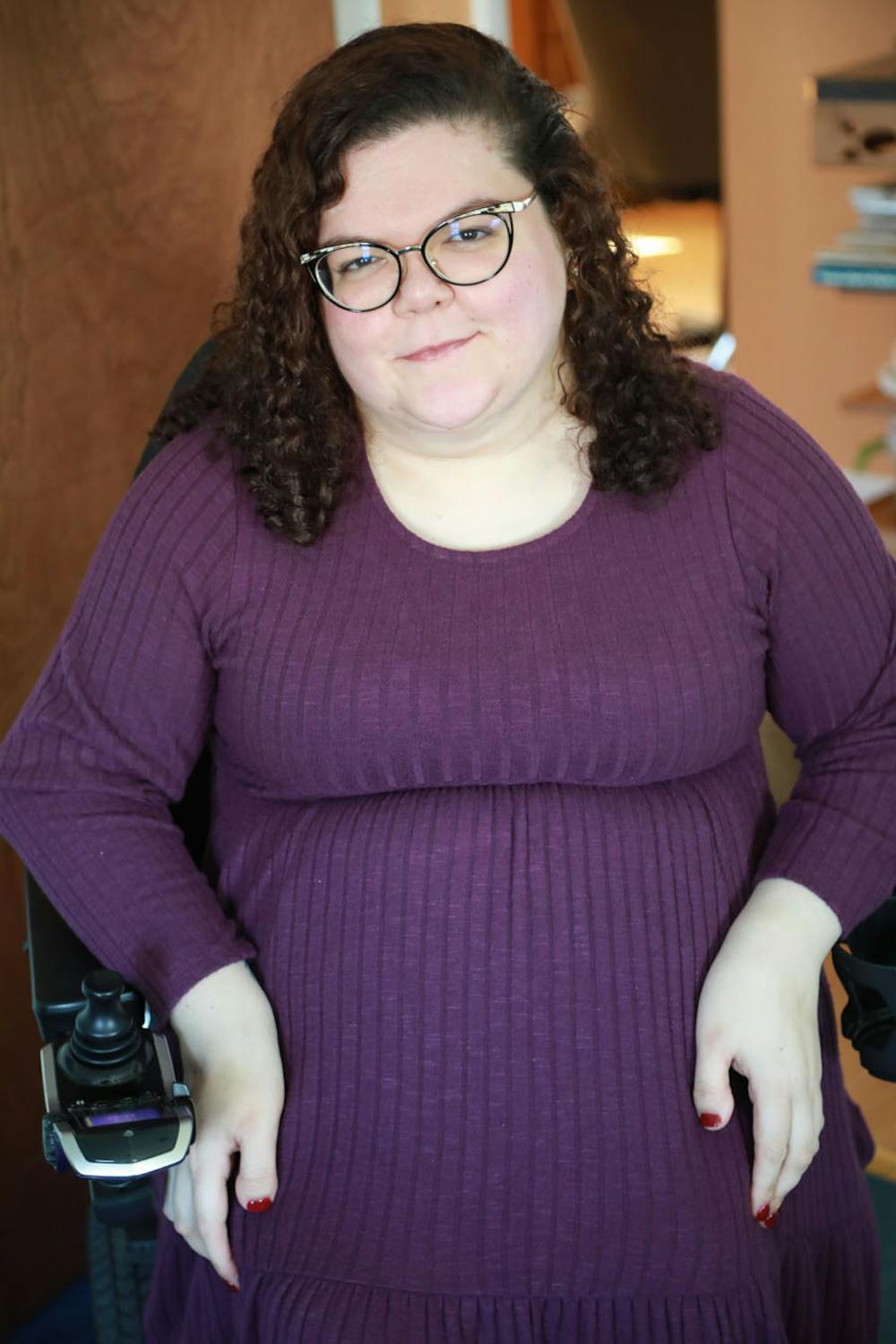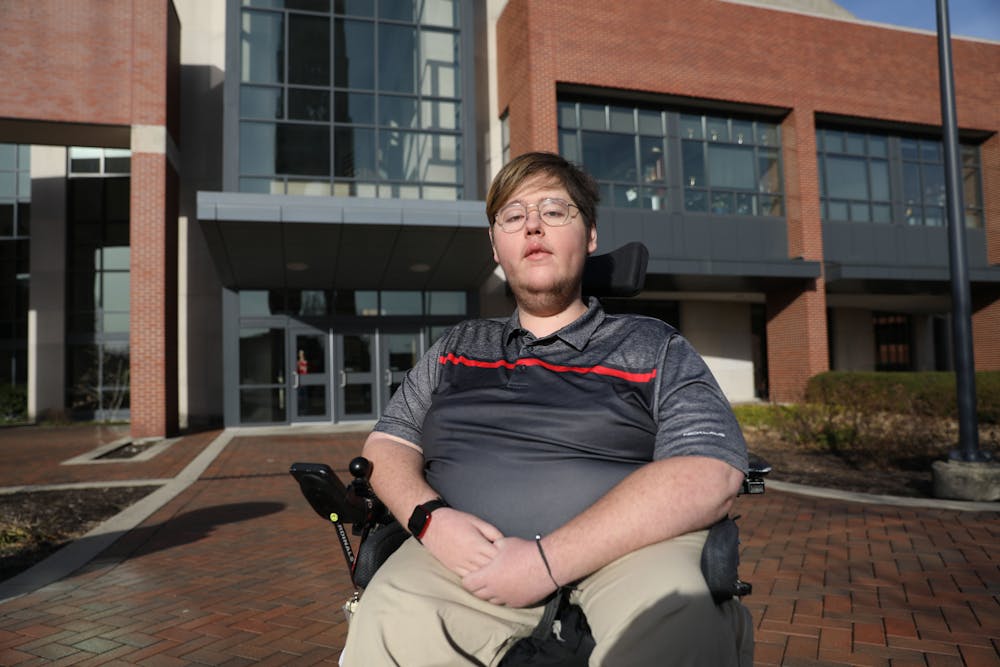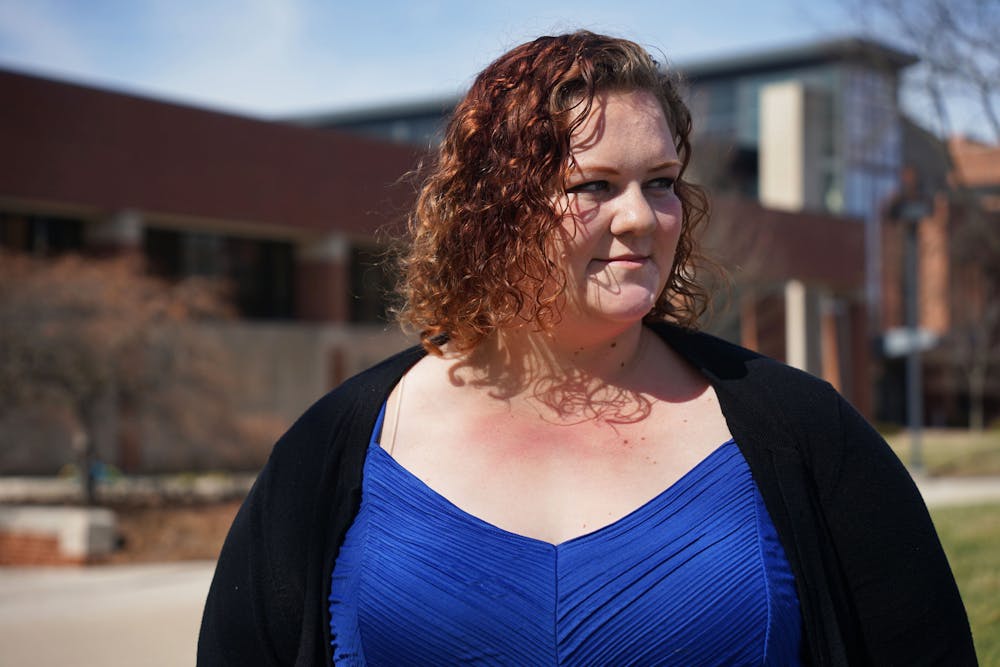Ball State University second-year James Nichols experienced his first heartbreak during his first year of college.
The social work major said he knew it wasn’t a flaw in character or his scruffy beard. Following weeks of messaging back and forth with someone he’d met, Nichols watched as the once-consistent texts trickled out, leaving him feeling as though his condition is what ultimately scared them off after an in-person date. When the person he went out with began to ignore him after their first time meeting, Nichols said, he knew their avoidance was because of his wheelchair.
“It feels as though I’m no one’s type,” the native of New Market, Indiana, said. “I often find that individuals can’t see past the wheelchair … They’re only able to see my disability.”
Nichols has congenital fiber-type disproportion, which requires him to endure countless treatments for crippling muscle myopathy that causes stiffness, spasms, cramps and fatigue in his skeletal muscles. Diagnosed with the rare genetic disease shortly after birth, Nichols’ life has had an added layer of difficulty in many aspects, including his navigation of the world of online and in-person dating.
Living with a visible disability means the people he encounters every day are aware of his physical differences, but in his online dating presence, Nichols tries not to lead with his condition. He wants the people he meets to get to know him before jumping to conclusions, he said.
After reaching a certain level of “comfort” with matches, Nichols has disclosed his health information. Each time, it resulted in ghosting or a lack of response.
“There is an immense amount of ableism when it comes to dating,” Nichols said. “People oftentimes don’t think that people with disabilities are able to be intimate or have feelings of love … I feel like people rely on stereotypes of people with disabilities rather than taking the time to ask questions [and] getting to know the person they’re talking to.”
An estimated one in four adult Americans have some type of disability, according to the Center for Disease Control and Prevention (CDC). George Gaither, a clinical psychologist, said the lasting stigmas associated with disabilities can make dating —– a pursuit that nearly half of American adults describe as difficult —– even more taxing. It can be difficult for people to know when and how to disclose their disability with potential suitors.
“People with disabilities can find it very difficult to connect with people that don’t have similar disabilities,” Gaither, also an associate professor of psychological science who specializes in human sexuality, said. “Heightened sensitivity, seen in those with autism for instance, can make it more challenging to be in a relationship with another person, especially in interabled relationships … We need to open that dialogue that every human has needs; an effort needs to be made in understanding and supporting those needs in all relationships.”
Emily Ladau has made this one of her many focuses since entering disability advocacy at age 10 when she appeared in a segment on “Sesame Street.” The 31-year-old was born with Larsen syndrome, a genetic physical disability that affects bone and joint development, leading her to use a wheelchair.

Ladau, an activist and author, has played an integral role in opening the dialogue on the rights of those in the disabled community. On March 22, Ladau spoke on campus about her personal experiences and how able-bodied people can be better allies to the disabled community.
The native of Long Island, New York, is currently a co-host of “The Accessible Stall” podcast with fellow activist Kyle Khachadurian where they discuss issues and give insight on topics in the disability community. While they “go against the grain” of the disabled community at large, they choose to speak their minds, according to their podcast website.
In 2017, Ladau wrote a piece for the New York Times, “Playing the Online Dating Game, in a Wheelchair,” in which she details her own struggles of online dating and “romantic rejection” due to her disability. After feeling unaccepted following her interactions on dating apps, she began to hide her disability — cropping her wheelchair out of profile pictures or not mentioning her disability in her bio.
But that didn’t last for long. Instead of continuing with the facade, she decided to open up about her disability, even if it meant rejection from strangers online. Ladau said she made this decision because she felt it was an important part of her disability, something she was proud of.
“Honoring another person’s needs and supporting them shouldn’t be considered a burden,” Ladau said. “It should be a central part of any relationship.”
First-year Ball State student Maya Harty said she didn’t feel she could be understood by a romantic partner until she started dating someone with the same neurodevelopmental disorder. In interabled relationships, where one partner has a disability and the other does not, she couldn’t find the comfort she felt she needed, Harty said.
The 18-year-old was diagnosed her senior year of high school with severe ADHD and mild autism, which presents sensory issues that control her everyday experiences. Stuck on a roller coaster of highs and lows, Harty said she became accustomed to feeling disconnected to those living without disabilities. Before her current partner, Harty said she felt guilty because of her “hurdles with intimacy.”
“In terms of intimacy, sensations can be extremely overwhelming,” the first-year biopsychology major said. “Sometimes the mind is willing, but the flesh resists. At first, I felt frustrated with myself, but [my partner] has been able to help me feel okay with listening to my body about its needs.”
For many of those with disabilities, both visible and invisible, finding a safe space to be comfortable and vulnerable can be a bit of an obstacle, Harty said. Trying to explain the difference between a good and bad day to someone without her disability can be complicated, she said, making coping and regulating even more hard.
“My partner [also has] ADHD, so they understand being overwhelmed, and they’re super wonderful about helping me co-regulate and deal with negative sensory input,” Harty said. “We’ve been together almost five years now, so we’ve learned to help each other."
Outside of disabilities, there are additional health imbalances that can drive sexual connections to the edge of impossibility because of limitations.

Emme Woodward is in her first year of graduate school at Ball State, studying social work. The Indianapolis resident said she is among the 133 million Americans who live with at least one chronic illness. Woodward began having chronic migraines at age 5, and even after years of medication, she continues to deal with symptoms like memory loss, fatigue, vertigo and tinnitus for days or even weeks.
“I have been scared to date,” Woodward said. “It’s a rotating door of what the migraines can do. There’s no understanding how hard [the migraine episodes] are physically.”
Many of her symptoms leave her facing dating-related difficulties: She may make plans to go out on a date but is too fatigued to stand, let alone drive. If she’s invited to get drinks with someone, she worries about the memory loss keeping her from knowing how she got to the venue. While Woodward has tried to engage in intimate relationships, people are often dismissive about how migraines affect her life.
“I’m too busy dealing with migraines, so when I get a break, I’m not thinking about dating,” Woodward said. “I think there’s such a stigma behind it. I’ll hear, ‘Oh, you get headaches?’ ‘You’re canceling because you have a headache?’ ‘It’s just a headache, we can still have fun.’ … That causes issues in early stages of a relationship.”
In the midst of an episode, Woodward describes herself as feeling “paralyzed,” especially when her sight starts to blur and she is struck with muscle pain.
“I hate to say it like this, but I almost feel like a slave to my migraines,” Woodward said. “They say jump, I ask how high … I can literally sit, dreading [the pain] for weeks before it is in full effect. It literally feels like being hit by a car in slow motion.”
When the pain subsides after an episode, she is often left without the energy to connect and be physically intimate with someone, she said. Sex, in a basic sense, can feel like a bit of a chore.
“People think I am being dramatic and just want to get out of doing things,” Woodward said. “I have had people ask me if having sex makes me feel better. It can be a genuine question, but other times it’s like, ‘How about I f–k you while you’re down to make you feel better?’ … just disregarding that I feel like utter s–t.”
When trying to open up about illness or disability, Gaither said it’s easier when intimate partners acknowledge and respect who is communicating and vocalizing their impairments.
“There needs to be a movement toward the idea that all human beings have sexual rights, whether you’re disabled or not,” Gaither said. “Instead of disregarding the sexuality of people who aren’t able-bodied, or even worse, fetishizing them, it’s better to recognize we all have different forms of needs — everyone should feel safe and supported in those needs.”
Feelings that a disability may be keeping her from finding love still linger, Ladau said. But she still feels that being open about her disability with others is her being true to herself.
“Accessibility is a love language,” Ladau said, “and there is so much more that defines me.”
Contact Kate Farr with comments at kate.farr@bsu.edu or on Twitter @katefarr7.




